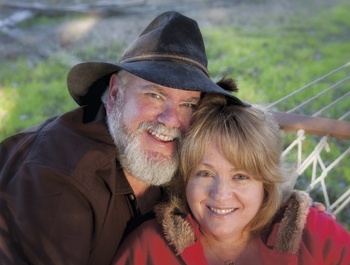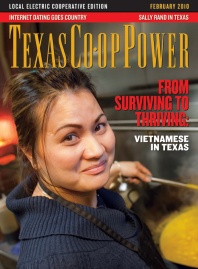Widower Warren Cooper never would have met the skydiving piano teacher in the course of his daily life. She lived 90 miles away, and they had no friends in common. In 2005, three years after losing his wife of 46 years to colon cancer, the retired petroleum geologist had relocated from Houston to the East Texas Piney Woods, on Sam Houston Electric Cooperative lines, where he built a house from plans he found on the Internet.
“I like the solitude out here,” says Cooper, who is lean and fit at 72. “But sometimes there’s too much solitude.”
He tried the singles group in Livingston, 10 miles to the east and the closest town, and he kept his eyes open at Sunday services at the Methodist church, but none of the unattached women were his type. The piano teacher was adventuresome and cultured. As a former Army paratrooper, Cooper found the combination especially appealing. As with his house plans, he found her on the Internet, in this case on www.match.com, where one-month packages start at $34. Founded in 1995, the Dallas-based company employs a staff of 340 and boasts $350 million in annual revenue. Match.com says it has 15 million subscribers, and neck-and-neck rival eHarmony (www.eharmony.com) claims to have more than 20 million registered users. Most of these folks reside in cities and suburbs, but a growing number live in small towns or on farms and ranches. For country singles, electronic matchmaking is a logical choice.
When a man living in the suburbs loses a spouse to divorce or death, or a woman in the city decides she’s ready to give up the single life, options for finding potential partners abound: Cultural and sports events, churches and civic clubs, bars and gyms, even supermarkets and shopping malls put them in contact with dozens of potential partners. Although starting a conversation may be a challenge (“Do you come here often?” “How do you cook spaghetti squash?”), at least the pool of candidates is deep.
But for rural singles, the pool is shallow. Residents of a town of 1,200 already know each other; so if they don’t fancy the recently divorced guy behind the counter at the feed store or the widow three pews ahead in church, they’re stuck. Or they were—until the advent of Internet dating. Amid photos posted of men standing next to their Porsches and women in Anne Klein cocktail suits are farmers astride state-of-the-art John Deeres and cowgirls combing prize-winning Santa Gertrudis.
The romance with the sky-diving piano teacher fizzled, but Cooper soldiers on. His goal is to meet someone every Saturday. Typically, after exchanging e-mails with a match and visiting by phone, Cooper will make a lunch date. He may drive 100 miles each way to a restaurant; and three times out of four, that first meeting is the last. Still, he finds it worth the effort.
“I’ve met all kinds of interesting people,” he says. “I’ve learned that everyone is entirely different, but I do think that what people put in their profiles is what they really want.”
His longest Internet-sparked relationship lasted several years but ended because the woman wanted to get married and he didn’t—a preference he’d made clear on his posted profile. Another decided she didn’t even want to meet him in person because she was turned off by his love of reading, especially his fondness for historical nonfiction.
More than once, Cooper has had an initially promising romance fold when his potential partner found that she didn’t like country living. He would meet a woman from Houston, Beaumont or those cities’ suburbs. They’d go out a few times, and as the rapport built, he’d invite her to spend the weekend at his place. Many times, the budding romance had wilted by Sunday afternoon. “I’ve had women come out here and not like the solitude,” Cooper explains. “If you’re used to living in the city, it can be unnerving.”
That rural-urban disconnect prompted Ohio entrepreneur Jerry Miller to launch FarmersOnly.com (www.farmersonly.com) and to promote it at agricultural trade shows with a banner declaring: “City Folks Just Don’t Get It!” Although he lives in a Cleveland suburb, Miller grew up in a rural area and owns a separate business firm catering to farmers and ranchers and the businesses seeking to reach them.
“I talked to single farmers and ranchers all over the country and discovered they all had the same problems,” Miller explains. “They already knew everybody in their immediate areas. They didn’t have time to socialize. When they did find time, they didn’t want to hang out at a bar. They wanted to find someone who understood their lifestyle.”
The Internet boasts scores of specialized dating sites. Many focus on religious preference—such as JDate (for Jewish singles, www.jdate.com), LDSRomances (for the Mormon community, www.ldsromances.com) and MuslimFriends.com (www.muslimfriends.com). Others, such as Indian Matrimonial Network (www.indianmatrimonialnetwork.com), cater to national origin. Despite the name, FarmersOnly.com isn’t just for farmers, Miller notes. The more than 100 marriages from his site that he’s been able to confirm include one between a rancher and a small-town schoolteacher. When a match works out well, members tend to let their $15-a-month ($45-a-year) memberships lapse, but occasionally a couple will e-mail Miller gushing about their wedding.
“I met Brian last September 8 on FarmersOnly,” Lisa McGregor of Shady Shores, southeast of Denton, wrote Miller. “We married January 17, 2009! Brian and I are a perfect match, and we knew it almost from the start.”
At 50, McGregor, an administrative assistant at a Denton hospital, had never married. She was waiting for a true soul mate, a man who shared her interests and values. She liked country people, ranchers and farmers, but she had yet to meet the right one. “You’re so limited in who you meet and who’s around you,” she said of small-town dating. Then here, on a rural Internet site, was Brian Jones, a 51-year-old third-generation cattle, sheep and horse rancher from Thermopolis, Wyoming. Faith played an important role in both of their lives. (Jones learned about FarmersOnly.com from his mother, who heard about it in church.) And he shared McGregor’s love of flea markets and Old West reenactments. He came down to Texas to meet her. A month later, they were engaged.
McGregor and Jones married in her mother’s backyard. She wore an authentic 1890s wedding gown; he wore his chaps and hat. Today they live in Shady Shores.
“I got my real cowboy, thanks to God and FarmersOnly.com!” she said.
Four years after its launch, FarmersOnly.com has more than 100,000 members nationwide, including more than 3,300 women and more than 1,700 men in Texas.
Although Darice Russell, divorced and 48, has yet to meet her perfect match, she’s been a happy FarmersOnly.com member for 2 1/2 years. Russell works for AT&T in Lubbock doing computer-assisted design. She lives 19 miles away, four miles outside of Slaton, population about 6,100, and gets her power from South Plains Electric Cooperative. She raises dogs, cats, goats and a rabbit, along with six parrots.
Explaining her preference for FarmersOnly.com, Russell says: “The pictures were so much more fun than those on Match.com. You see these guys on their tractors … and when you get to know them, they’re a lot more down to earth.” She also likes the variety, noting that she once met a man online who made his living breaking mules.
“When the guy down the road put his goats on my property, I mentioned that on my profile,” she recalls. “After that, I got all these hits from men who wanted to talk about goats.”
Russell likes the pace of rural e-dating. She says the men tend to be willing to take the time for a relationship to develop and to be more gentlemanly and romantic than their urban counterparts. Most of all, they share her lifestyle. “Everybody understands that you have chores at home, like animals to take care of,” she says. “Everybody understands what it’s like when it rains and your road washes out.”
That’s important early in a relationship when a romantic weekend away requires finding someone to slop the hogs and milk the cows. It’s even more important if a relationship gets serious and the prospective marriage partners both love their farms and have to decide which place to lease out—his or hers. For rural Texans, potentially sharing a life means embracing the challenges and joys of country living.
——————–
Sandy Sheehy is author of Connecting: The Enduring Power of Female Friendship (William Morrow, 2000).


